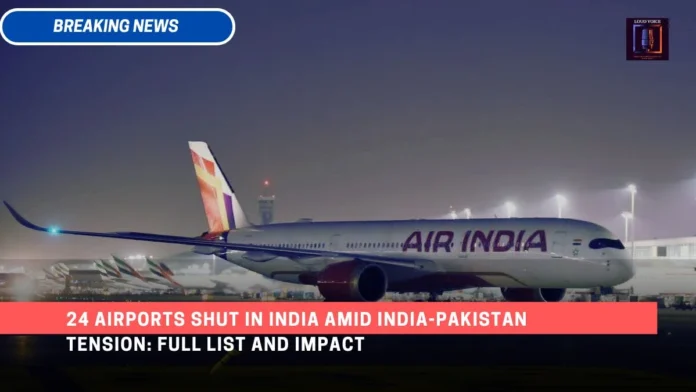Key Takeaways
- 24 airports in India are temporarily shut down due to escalating tensions between India and Pakistan.
- Key airports such as Chandigarh, Srinagar, and Jaisalmer are among the affected.
- Heightened security measures are in place across all airports, with delays and flight cancellations expected.
- The shutdowns come in the wake of drone and missile attacks from Pakistan on Indian cities, as well as India’s military retaliation.
24 Airports Shut in India Amid India-Pakistan Tensions: Introduction
24 airports nationwide have been temporarily closed by the Indian government due to rising tensions between India and Pakistan. The sudden move comes as the situation intensifies, following a series of missile and drone attacks launched by Pakistan on Indian cities. These strategic airspace shutdowns are part of an effort to secure sensitive areas and ensure the safety of civilians and military personnel alike.
The Civil Aviation Ministry confirmed that as of Thursday evening, civil aviation operations have been suspended at numerous airports, including major hubs like Chandigarh, Srinagar, and Jaisalmer. This unprecedented action is a direct response to the security threat posed by the recent attacks. In this article, we’ll explore the full list of affected airports, the reasons behind the shutdowns, and the broader implications for travelers and security operations in India.
Full List of Airports Affected by the Shutdown
The following airports in India are currently closed for civil flight operations due to the heightened security risks:
- Chandigarh
- Srinagar
- Amritsar
- Ludhiana
- Bhuntar
- Kishengarh
- Patiala
- Shimla
- Kangra-Gaggal
- Bathinda
- Jaisalmer
- Jodhpur
- Bikaner
- Halwara
- Pathankot
- Jammu
- Leh
- Mundra
- Jamnagar
- Hirasa (Rajkot)
- Porbandar
- Keshod
- Kandla
- Bhuj
The affected regions are largely in northern and western India, particularly close to the borders with Pakistan. These include states like Jammu & Kashmir, Punjab, Rajasthan, and Gujarat, all of which are crucial in India’s national security strategy.
Escalation of Tensions: What Triggered the Shutdowns?
The shutdowns follow a significant escalation in India-Pakistan relations, with a Pakistani drone and missile attack striking key cities in Jammu, Punjab, Gujarat, and Rajasthan. The Ministry of Defence confirmed that the incursion was of Pakistani origin, though Indian air defense systems successfully intercepted the threats before they could cause major damage. The attack was part of a larger military maneuver that also included drone strikes.
India launched “Operation Sindoor,” a targeted military operation against terror infrastructure in Pakistan and Pakistan-occupied Kashmir (PoK), at the same time as this escalation. This operation was a direct response to the April 22 terrorist attack in Pahalgam, India, which claimed the lives of several Indian soldiers. The retaliation marked a significant increase in military tensions and has led to heightened security measures throughout India.
The escalation has been marked by power outages, air raid sirens, and even the suspension of ongoing sporting events. A key example of this disruption occurred in Himachal Pradesh, where an IPL cricket match was interrupted due to air raid sirens.
Impact on Travelers and Airlines
The closure of these airports has had a significant impact on domestic and international air travel. Many airlines, including IndiGo, Air India, and SpiceJet, have suspended flights from the affected airports, with several flights being diverted to operational airports. IndiGo reported the cancellation of 165 flights, while Air India and Air India Express had a similar number of cancellations, particularly impacting flights to and from Amritsar.
Additionally, Air India diverted two international flights enroute from Amritsar to New Delhi. This shift is a direct result of the airport closures, which has left travelers scrambling to adjust their plans.
Heightened Security Measures: What Travelers Can Expect
As the situation remains fluid, heightened security checks and procedures are expected across airports in India. Airlines are advising passengers to arrive at airports earlier than usual to accommodate enhanced screening processes and other security formalities.
IndiGo, for example, urged passengers to arrive at least three hours before their flights, while SpiceJet and Akasa Air provided similar advisories. It’s clear that travel will be less predictable for the foreseeable future, with more delays, cancellations, and rerouted flights likely.
IndiGo also provided an important note on social media: “In these extraordinary times, heightened security measures are in place at all airports. We request you to allow some extra time for your journey to accommodate security checks and formalities. We appreciate your understanding and cooperation.”
What This Means for India-Pakistan Relations
The closing of these airports demonstrates the gravity of the current situation between India and Pakistan. With both countries on high alert, the threat of further military actions remains. The drone and missile attacks, combined with India’s retaliatory strikes, have set the stage for what could be a prolonged period of heightened conflict. As tensions remain high, both nations are likely to continue their military readiness, and civil aviation authorities will need to adjust accordingly.
This situation also underlines the vulnerability of civilian infrastructure, especially transportation hubs like airports, in times of geopolitical conflict. The temporary closures highlight the delicate balance that authorities must maintain between securing airspace and ensuring normal life continues as much as possible.
Conclusion: Navigating the Impact of Tensions
As the situation continues to evolve, the closure of 24 airports across India underscores the growing threat of cross-border military action and its impact on civilian life. While security measures are crucial, travelers will need to remain adaptable, understanding that air travel will be unpredictable in the short term. It serves as a sobering reminder of the dangers that arise during periods of global unrest and the significance of readiness.
In the coming days, India’s airspace will remain under intense scrutiny, with authorities continuing to balance national security and public safety. Travelers are advised to keep abreast of the latest updates and follow airline instructions to minimize disruptions.


